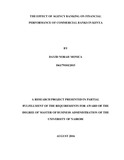| dc.description.abstract | In most developing countries, the banking sector has adopted several delivery channels to ensure that financial services reach both the banked and the unbanked especially in the remote areas. Agency banking will enhance the access to financial services, and at reduced expenses in rural regions. The study sought to establish the impact of agency banking on the financial performance of commercial banks in Kenya. Descriptive research was used in this study. The target population for the study was 17 commercial banks of Kenya that had adopted agency banking as at December 2015. The study used secondary data, which was collected from the CBK bank supervision annual reports and audited financial statements for the banks as well as their annual reports. Annual reports were analyzed for a period of 3 years, between 2013-2015.The study used multiple regression analysis to find out relationship between the agency banking in terms of the number of agents, the volume of transactions undertaken by agents, and the bank size as the control variable and the financial performance of banks as measured by return on assets. The data collected was analyzed using Statistical Package for Social Sciences (SPSS). The findings suggest that the regression model significantly predicts the dependent variable, implying that agency banking has a significant impact on the financial performance of commercial banks. The coefficient of multiple correlation, multiple R, stood at 0.602. The coefficient of determination, R Square, suggests that 36.3% of the variation in the dependent variable results from the variation in the independent variables in the regression model. The large proportion of the variation in the dependent variable suggest that the regression model can explain the role of agency banking in the financial performance of commercial banks. The study concluded that increase in the number of agents of commercial banks lead to their increased financial performance hence there is a positive correlation between the number of agent outlets and financial performance. The study findings indicate that there is strong and positive correlation between the commercial banks’ return on assets, volume of cash transactions and the banks’ size with the financial performance. The variables in the study influence the financial performance of commercial banks jointly. The study recommends that the regulators consider reforming the regulatory framework to encourage more commercial banks to enhance the adoption of the agency-banking model. By adopting agency the volume of transactions in the commercial banks will increase hence leading to the improvement of the financial performance. | en_US |



